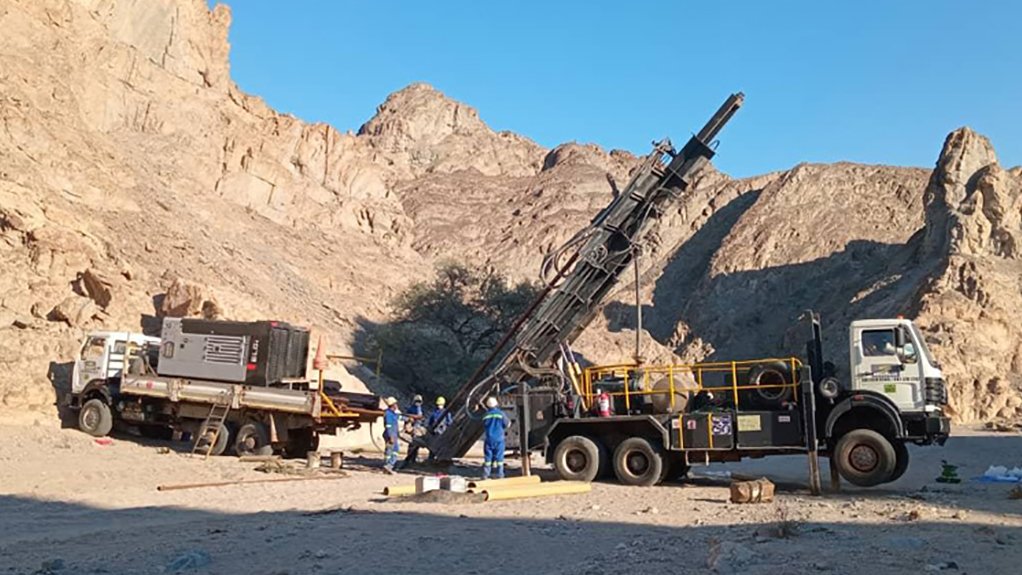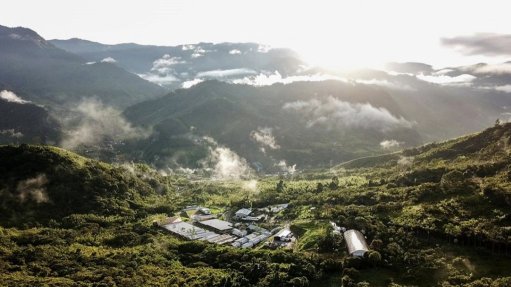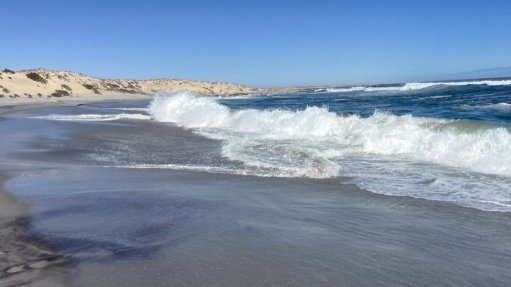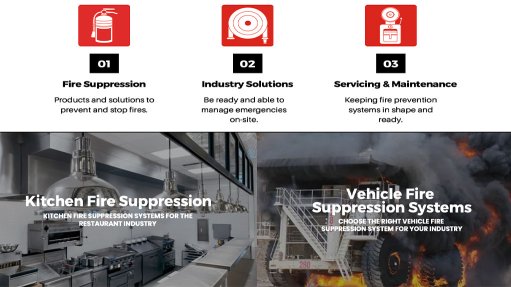Madison confirms high-grade uranium deposits after completing maiden drill programme at Khan
Uranium exploration company Madison Metals has completed its maiden reverse circulation (RC) drill programme of 997 m over nine holes at its Khan uranium project at Madison West, located in Namibia’s Central Erongo uranium province.
Drilling has confirmed high-grade uranium deposits.
The company reported on June 25 that uranium mineralisation was successfully intersected at depth in six of the nine drill holes.
The most significant observations during Madison’s chip logging include elevated X-ray fluorescence (pXRF) readings from chips with a maximum value of 1.54% triuranium octoxide (U3O8).
Multiple mineralised zones were intersected, including a 15-m mineralised zone averaging pXRF 0.3% U3O8.
Fresh mineralised D-type leucogranite are characterised by smoky quartz.
The recent nine holes confirm Madison’s geological expectations and logging has confirmed that uranium-bearing D-type alaskites have intruded the Khan group, which is comprised of calc-silicates, quartzites and schists at depth.
“We are excited and encouraged by the results of our maiden drill programme, having successfully intersected uranium mineralisation at depth in six out of the nine holes drilled. This achievement marks a significant step forward in our exploration programme.
“The confirmed stratigraphic level on the property provides the ideal conditions for high-grade alaskite-hosted uranium mineralisation similar to that at the Rossing and Husab mines in Namibia,” Madison director and geological engineer Dr Roger Laine said.
The drill holes targeted various previously identified uranium-bearing outcrops along the 12 km Anomaly 5 target. The holes were drilled to determine the subsurface extension of high-grade uranium mineralisation, both laterally and at depth. Uranium mineralisation was intersected in six of the nine drill holes, with logged yellow product observed over the highest-grade intervals.
DETAILS
KM5RC001 was drilled to intercept mineralisation between the surface Trenches KM5TR001 and KM5TR002. The drill hole intercepted a 3 m mineralised alaskite starting at 19 m below surface.
Two holes (KM5RC003 and KM5RC007) were drilled under the surface trench KM5TR003 and were extended to intercept a surface expression 50 m from the trench. Both holes intercepted multiple lenses of mineralised alaskites of more than 2 m thickness starting at 35 m below surface. The deepest mineralised alaskites were intersected at 114 m below surface in both drill holes.
The drilling has yielded significant achievements, even under challenging conditions. Owing to ground accessibility issues, a set of fan holes (KM5RC005 and KM5RC006) was also drilled to intersect KM5TR004 and KM5TR005. KM5RC005 confirmed mineralisation starting at 46 m below surface.
KM5RC008 and KM5RC009 were drilled to test the surface mineralisation and alaskite orientation south of KM5TR001. KM5RC008 intersected a 1-m-thick alaskite at 33 m below surface with a pXRF reading of 1.19% U3O8.
Some RC chip samples have been sent for analysis and final analytical assay results are expected in the coming weeks, Madison said.
Follow-up drilling is being planned to further define the lateral and vertical extent of uranium mineralisation discovered to date.
Article Enquiry
Email Article
Save Article
Feedback
To advertise email advertising@creamermedia.co.za or click here
Press Office
Announcements
What's On
Subscribe to improve your user experience...
Option 1 (equivalent of R125 a month):
Receive a weekly copy of Creamer Media's Engineering News & Mining Weekly magazine
(print copy for those in South Africa and e-magazine for those outside of South Africa)
Receive daily email newsletters
Access to full search results
Access archive of magazine back copies
Access to Projects in Progress
Access to ONE Research Report of your choice in PDF format
Option 2 (equivalent of R375 a month):
All benefits from Option 1
PLUS
Access to Creamer Media's Research Channel Africa for ALL Research Reports, in PDF format, on various industrial and mining sectors
including Electricity; Water; Energy Transition; Hydrogen; Roads, Rail and Ports; Coal; Gold; Platinum; Battery Metals; etc.
Already a subscriber?
Forgotten your password?
Receive weekly copy of Creamer Media's Engineering News & Mining Weekly magazine (print copy for those in South Africa and e-magazine for those outside of South Africa)
➕
Recieve daily email newsletters
➕
Access to full search results
➕
Access archive of magazine back copies
➕
Access to Projects in Progress
➕
Access to ONE Research Report of your choice in PDF format
RESEARCH CHANNEL AFRICA
R4500 (equivalent of R375 a month)
SUBSCRIBEAll benefits from Option 1
➕
Access to Creamer Media's Research Channel Africa for ALL Research Reports on various industrial and mining sectors, in PDF format, including on:
Electricity
➕
Water
➕
Energy Transition
➕
Hydrogen
➕
Roads, Rail and Ports
➕
Coal
➕
Gold
➕
Platinum
➕
Battery Metals
➕
etc.
Receive all benefits from Option 1 or Option 2 delivered to numerous people at your company
➕
Multiple User names and Passwords for simultaneous log-ins
➕
Intranet integration access to all in your organisation





















